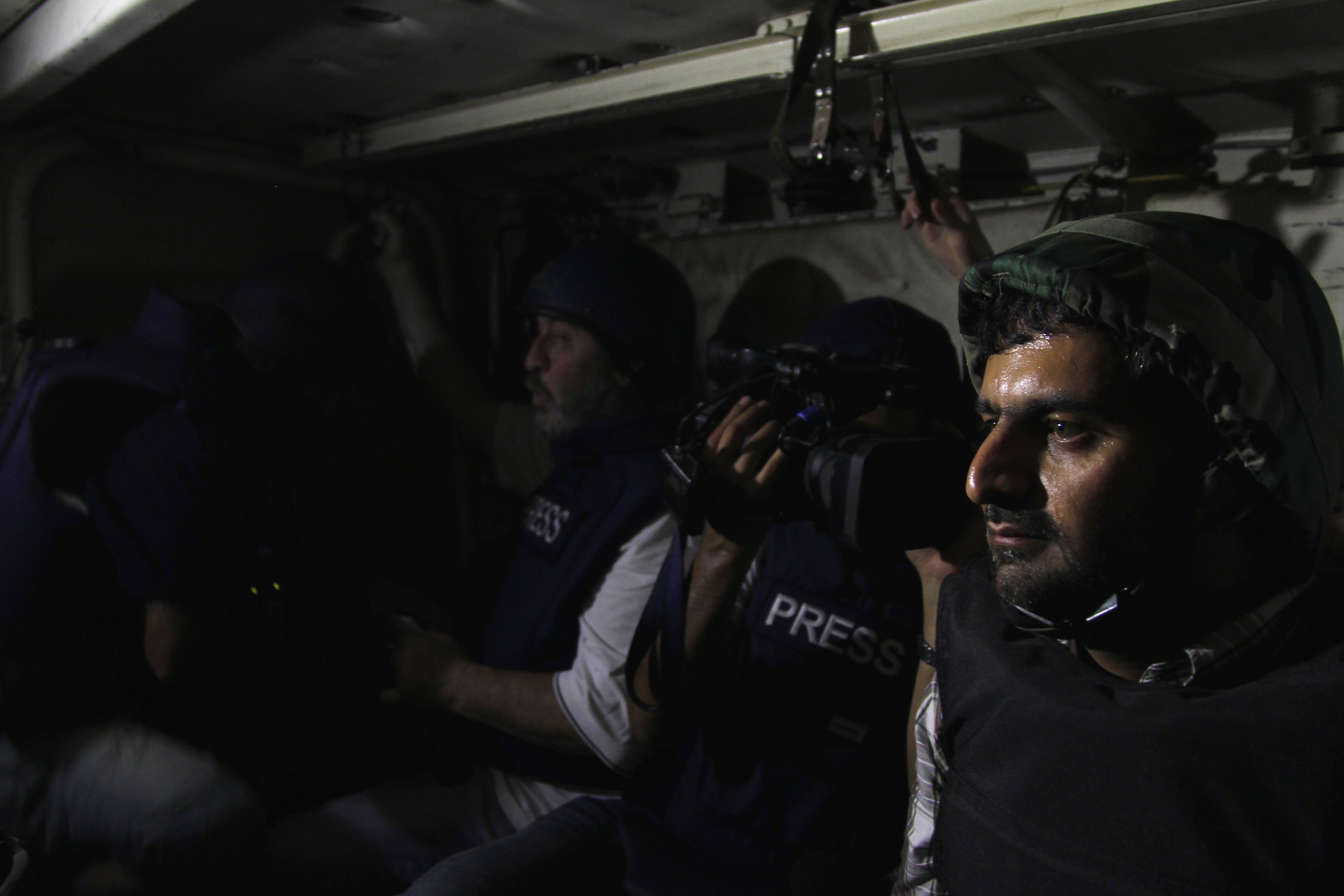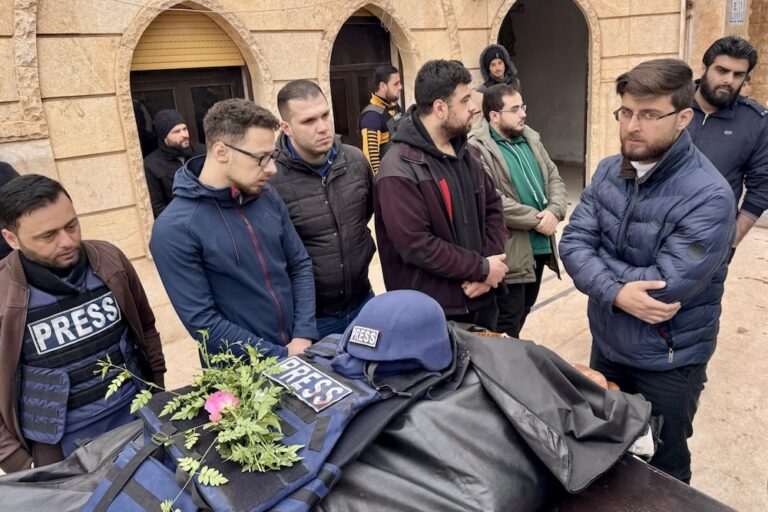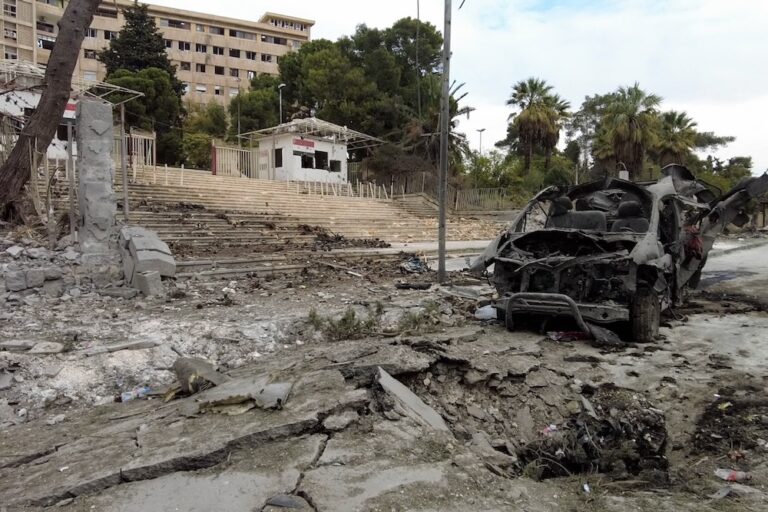News providers are being assailed on all sides in Syria, not only by the army but also by the opposition, which is increasingly responsible for abuses against both Syrian and foreign journalists.
Amid growing signs of imminent western military intervention in Syria, Reporters Without Borders has compiled figures that show that around 100 news providers have been killed in Syria since the start of the conflict in March 2011. They include 25 professional journalists (six of them foreign) and around 70 citizen-journalists (all Syrian).
At the same time, a total of 14 foreign journalists and more than 60 Syrian journalists and citizen-journalists are currently detained or missing after being arrested or abducted.
Reporters Without Borders reminds all parties to the conflict that, like all civilians, media professionals are protected by international conventions and must not be targeted or detained while covering a war that has already cost more than 100,000 lives.
As the government continues its relentless persecution of news providers that it regards as unwanted witnesses, Syria is now the world’s most dangerous country for journalists, citizen-journalists and other information activists.
News providers are being assailed on all sides, not only by the regular army but also by the opposition, which is increasingly responsible for abuses against both Syrian and foreign journalists.
Arrest and abduction of journalists by armed opposition groups, especially jihadist groups such as Jabhat Al-Nosra and Dawla Islamiya, also known as Islamic State of Iraq and Syria, or ISIS, is an increasingly significant component of the spiralling violence.
Most of the abuses against news providers that Reporters Without Borders has registered in recent months have been the work of ISIS, which aims to impose its law in the territories it controls. Many journalists have been arrested by “Hayah Al Shareia” or “Legal Committees” established to administer justice.
Opposition forces get tougher
Reporters Without Borders is extremely worried by the growing number of Syrian and foreign journalists who are being arrested or abducted by armed opposition groups, especially ISIS and Jabhat Al-Nosra. It has become increasingly clear in recent months that most of these abuses are attributable to ISIS, which aims to impose order on the territory it controls.
Hadi Baghbani, an Iranian documentary filmmaker who worked for the Iranian national radio and TV broadcaster and for media that support the Revolutionary Guards (such http://www.tasnimnews.com/), was killed near Damascus on 20 August while “embedded” with the Syrian regular army.
Ismail Heydari, and Iranian who was killed the next day, was described as a “documentary filmmaker” by the Iranian government news agency ISNA but was in fact a Revolutionary Guards commander.
Mohamed Nour Matar, an activist who is the brother of the journalist Amer Matar, disappeared in the northern city Raqqah on 13 August after going there to cover fighting between ISIS and the “Ahfad Al-Rasoul” (Descendants of the Prophet) Battalion for control of the city. There has been no word from him since then and no sign of his body has been found in any of Raqqah’s hospitals. A first-aid worker found Matar’s charred camera at the site of an ISIS suicide bombing against “Ahfad Al-Rasoul” on 13 August.
Matar was previously arrested on 9 July while on his way with his camera to a sit-in being staged outside the headquarters of the Raqqah provincial government to demand the release of persons held arbitrarily by ISIS. He was freed two days later.
There has been no news of Sami Jamal, a freelance reporter for Radio Rozana, was abducted by ISIS at Al-Atarib (east of Aleppo) on 14 August.
And there is still no news of Aboud Haddad, a Syrian armed forces defector who became a photographer in 2011 and who was abducted by ISIS in Idlib province on 26 June of this year as he was about to return to Turkey. It is not known why ISIS is holding him.
Zakaria Haj Jamo, a reporter for the Yekiti Media website, was abducted a few kilometres from the town of Tel Abiyad, in Raqqah province, on 21 July while covering fighting between Kurdish militants and Jabhat Al-Nosra for control of the area.
A Yekiti Media journalist told Radio Rozana that Jamo was abducted by Jabhat Al-Nosra, which kidnapped other civilians that day. There has been no news of Jamo since then.
Mohaimen Al-Halabi, a citizen-journalist who works with the Syrian Centre for Media, was arrested in Deir Hafer, near Aleppo on 4 August, when the Riyat Al-Nasr brigade was incorporated into the Ahrar Al-Sham coalition. He was arrested by Abu Jaber, Ahrar Al-Sham’s leader in Raqqah, for displaying a sign critical of Ahrar Al-Sham.
Ali Abu Al-Majed, a reporter for Akhbar Al-An TV, was arrested by the Khadhifa Bin Al-Iman armed opposition group in the north-central city of Raqqah on 27 July, along with a civil engineering student. He said he was badly beaten for three hours before being released the next day. Read his testimony.
Jabhat Al-Nosra arrested Ahmed Omarin, a reporter for the Welati.net news website, in Tel Abiyad for several hours on 19 July, reportedly hitting and insulting him before finally releasing him.
Welati.net also reported that the Assayesh or security wing of the PYD (the Syrian branch of the Kurdistan Workers’ Party) arrested Abdelrahim Takhoubi, an information activist with the Local Coordinating Committees, in Amuda, a town on the Turkish border west of Qamashli, on 8 July and held him for 12 days.
His arrest was linked to the PYD’s use of force to disperse a peaceful demonstration in Amuda, resulting in several deaths, injuries and arrests.
News and information activists Mosaab Al-Hamadi and Yalmaz Ibrahim Pasha were arrested by Jabhat Al-Nosra in Tel Abiyad (Raqqah province) while covering clashes between the Free Syrian Army and the regular army outside the 17th army division’s headquarters on 9 June.
Jabhat Al-Nosra arrested Mustapha Al-Ahmady, a citizen-journalist and freelancer also known as Abou Jaafar Al-Halabi, in Jarabulus (a border town north of Manbij) on 11 June, reportedly torturing him in public before placing him in detention. He was released five days later (). Ahmady had done a lot of reporting, including live reports, for Arabic-language media on the situation in Jarabulus ever since the start of the unrest in Syria in March 2011.
Members of ISIS attacked the headquarters of the Free Syrian News agency in Raqqah on 8 May, arresting 10 members of its staff and three visitors. The visitors were released 10 days later, but the others were held for 25 days and were mistreated and tortured, they said.
They included Jassem Awad (the head of the agency), Jameel Salou (the editor in chief and founder), Mo’taz Al-Issa (the Raqqah editor), Mohamed Sobhi (the head of public relations) and Yalmaz Ibrahim Pasha (the Ras El-Ein correspondent).
Arrests by Islamic courts
Also disturbing is the frequency of arrests by the “Hayah Al Shareia” that the various armed opposition groups have created to administer justice in the areas they control. Each armed group sets up a police force, courts and prisons in the territory it controls.
After taking eastern Aleppo, the various rebel brigades or liwa (battalions) created the Aleppo United Court in September 2012 as part of an attempt to create a new civilian administration and to punish mistreatment of the civilian population by Free Syrian Army members.
This court was meant to extend its authority over the rest of Aleppo province and to coordinate the creation of local courts in each town but a lack of resources opened the way for other initiatives, above all the creation of the “Hayah Al Shareia” by Al-Tawheed, Ahrar Al-Sham, Suqqur Al-Sham and Jabhat Al-Nosra in November 2012.
The two court systems began competing with each other while the Aleppo city government and the “Hayah Al Shareia” began competing for control of the city. Negotiations are currently under way to merge the two Aleppo courts but the United Court has been losing influence because of a lack of funding while the “Hayah Al Shareia” is refusing to cooperate with Aleppo’s civilian institutions.
The Aleppo “Hayah Al Shareia” tries to coordinate the activities of its counterparts in other liberated areas with the aim of standardizing practices and rulings, but some are resisting. At the same time, it has lost influence since Jabhat Al-Nosra’s withdrawal in March, while ISIS seems to be trying to control the “Hayah Al Shareia” in the liberated areas it controls.
The various courts – the United Court, the “Hayah Al-Shareia” that cooperate with centralization initiatives, and the autonomous “Hayah Al-Shareia” – apply different laws, depending on the judge and the political tendency of the group controlling the territory.
The courts base their decisions directly on religious texts or on the Unified Arab Penal Code, which the Arab League issued in Cairo in 1996. The absence of a single body of law and the lack of coordination between these committees results in arbitrary decisions on detainee rights and sentencing.
Zaid Mohamed, a photographer who contributes to the activities of the Lens Young Halabi Facebook page, was arrested by the Aleppo “Hayah Al Shareia” on 10 July for calling publicly for the creation of a democratic and secular state in Syria. He was released the next afternoon.
A court in the west Aleppo district of Azza ordered the arrest of media activist Abdullah Maraai on 1 July in response to a complaint by “Abu Baker,” the head of the Batbo brigade, about an article in the Attarb-based weekly Zi Qar entitled “Dove in battle and wildcat with the poor” that criticized the way he maintained order.
Maan Mohamed, who works as press attaché for the Masakin Hanano local council in Aleppo was arrested by the Hanano section of the Aleppo “Hayah Al Shareia” in May because, during a demonstration, he had displayed the flag of the revolution with an inscription of the Doctrine of Oneness instead of a black flag.Shamil Al-Ahmed, who works at the Aleppo media centre, and media activist Milad Al-Shabahi were also briefly detained, interrogated, threatened and beaten, and their cameras were seized.
Government continues its crackdown
News providers killed
Several citizen-journalists and other information activists have been killed by the regular army in the past three months while gathering information.
Recent victims include Shahir Muaddamani, the head of the Local Council’s media bureau in Daraya (on the outskirts of Damascus), who was fatally injured by an exploding shell as he was going to cover fighting on the Al-Alali front, on the Sahnaiya road, on 16 August.
Orient TV correspondent Pesheng Alo was injured by a shot fired by a sniper while covering events in the Aleppo district of Ashrafieh on 28 July. Orient TV ‘s correspondent in the Damascus suburbs, Hadi Al-Menjed, was covering Free Syrian Army operations in Ghazlanieh the next day when he was injured in the hand and leg in a regular army raid.
Ammar Dendech, an Orient TV correspondent based in Jisr Al-Shughour, in the northwestern province of Idlib, was injured on 23 July by shrapnel from a drum filled with explosives that the regular army threw from a helicopter.
Continuing arrests
There is still no news of Abdurahman Rya, a video technician who was arrested by security officials at his office on Baghdad Street in Damascus on 7 June. Aged 47 and the father of four children, he is one of Orient TV’s founders. It is not known what he is charged with.
The cartoonist and artist Youssef Abdelke was arrested with two friends at a checkpoint on the outskirts of the western city of Tartus on 18 July, and was released on the orders of a judge on 22 August. He was one of the signatories in 2011 of “Principles of the Revolution,” which called for the departure of President Bashar Al-Assad and some of his ministers, and the creation of a transitional government under UN aegis.
Radwan Murtada, a Lebanese journalist working for the daily Al-Akhbar, was arrested by four policemen at his Damascus hotel on the night of 20 July. He told Reporters Without Borders he was taken to a security centre in Kafr Sousseh and was interrogated five times there on 21 July before being released the next day.
Shaza Al-Maddad, a journalist with Al-Khabar and Baladna who was arrested on 2 November 2012, was finally released on bail on 10 July but she is still awaiting trial by a terrorism court.
Journalist and blogger Kamal Sheikhou was arrested by security officials in Damascus on 7 July and was held until 23 July. According to the Syrian Centre for Media (SCM), he was previously arrested as he tried to cross the border into Lebanon on 26 June 2010, when he was charged with “publishing mendacious reports liable to undermine national morale.”
Fouad Hamira, a screenplay writer who was arrested on 28 June while trying to renew his passport at the Immigration and Passports Office in the western city of Latakia, was released on 9 July. Four days after his arrest, he was transferred to Damascus for further interrogation, above all about his position as head of the Movement for a Pluralist Society’s political bureau.
Samir Radouane, a member of the Union of Arab Writers and scriptwriter of Walida Min Khassira, a TV series broadcast by Lebanon’s LBC, was arrested at the border on 16 June as he was returning from filming its third season in Lebanon. He was released on 27 June.
The official reason for his arrest is still unclear, but some are linking it to the fact that Walida Min Khassira’s third season, entitled “Minbar Al-Mouta”, contains veiled criticism of the politics and morals of Syrian society. Radouane used to be a presenter on Syrian national television and Al-Dounia TV.
Waed Al-Mhanna, a journalist with the newspaper Al-Thawra, was held by the police from 26 May to 6 June, apparently in connection with articles about alleged corruption in archaeological circles.
More trials
The trial of Mazen Darwish, head of the Syrian Centre for Media and Freedom of Expression (SCM), and two of his employees, Hussein Gharir and Hani Zaitani, resumed on August 21st.
Arrested on 6 February 2012 because of their peaceful commitment to freedom of expression, they are facing up on 15 years of imprisonment with forced labour on a charge of “publicising terrorist actions” under article 8 of an anti-terrorism law that President Assad signed in 2012.
Two people who were arrested with them and who were released on 6 February, Mansour Omari and Abdel Rahman Hamada, are also being tried. On 19 May, the judge postponed the next hearing until 26 June, and then postponed it until 21st August, when he postponed it yet again until 2 October. When the hearing is finally held, he is supposed to decide whether to maintain or dismiss the charges brought against them by Syrian air force intelligence.
The charges clearly constitute a violation of freedom of information. The indictment says Darwish has been charged as head of the SCM and that Gharir and Zaitani have been charged because of their activities within the centre.
The offending activities named in the indictment include monitoring information posted online by the Syrian opposition, publishing reports on human rights and the situation of the media in Syria, and documenting the number and names of those detained, missing, wanted, or killed since the start of the conflict.
According to the indictment, the investigating judge regarded these activities as constituting an attempt to “destabilize the internal situation, one that led international organizations to condemn Syria.” Darwish was awarded the Reporters Without Borders press freedom prize in 2012.
Bilal Ahmed Bilal, a journalist held since 13 September 2011 who used to run Falesteen Al-Youm TV (Palestine Today TV), was sentenced to 15 years in prison by a military court on 12 June because of his coverage of events in the west Damascus district of Mo’damieh Sham in 2011.



